The Attorney-General of the Federation and Minister of Justice on Monday told a Federal High Court in Abuja that the Independent National Electoral Commission (INEC) is vested with the power to conduct, supervise and organise elections in the country as enshrined in the constitution.
Arguing on the preliminary objections brought by the Counsel to the National Assembly challenging the jurisdiction of the court challenging the suit by the Accord Party seeking to stop the legislative arm from overriding the Presidential assent to the re-ordering of the election sequence he stated that there is life issue which can invoke your jurisdiction to determine the suit.
The AGF urged the court to invoke its jurisdiction to determine the plaintiffs suit.
Specifically, the National Assembly had questioned the jurisdiction of the Federal High Court in Abuja to hear a suit that was filed by the Accord Party to stop the legislative arm from overriding President Muhammadu Buhari’s refusal to assent to the election re-ordering sequence.
At the resumption of proceedings on Monday, Mr. Joseph Daudu (SAN), counsel to the National Assembly (NASS), informed the presiding judge, Justice Ahmed Mohammed that he had filed a preliminary objection to the suit.
Daudu predicated his preliminary objection on the ground that the issues canvassed in the plaintiff’s originating summons were not “justiceable”, arguing, “The internal workings of the NASS are not justiceable.”
In moving the NASS objection dated March 23, Daudu argued:”The most important aspect of this objection, is whether the entire Originating Summons (consisting the reliefs and questions for determination) are justiceable.
“What is being challenge is a bill or an act of the NASS , no matter how stretched or construed the electoral act amendment bill was at the date of filing this suit till today, is a bill. It becomes an act upon the happening of two eventualities: One, where the President acting on section 58 (4), assents to the bill, and where he refuses to assent under section 58 (5) of the 1999 Constitution, the bill is returned to the NASS for the use of their veto (power) to override. At that point in time, it continues to be a bill because there is a possibility that they may not gather enough support, that is, the two/thirds to override the bill.”
He further submitted that “Section 58 (1) of the Constitution says, “The powers of NASS shall be exercise by bills passed by senate and House of Representative and assented to by the President.
“By their (plaintiff) own admission, the President has withheld his assent. Anything short of this does not ignite the jurisdiction of the Federal High Court,” Daudu stated.
Also arguing on the issue of the plaintiff’s locus Standi (right to institute the suit), Daudu contended that the plaintiff is not a registered political party, saying, “We submit that the only way a political party can be recognised is through the exhibition of certificate of registration. In this case, the plaintiff has not shown any certificate of registration in its processes. Therefore, there is no basis for this suit.”
As a result, the NASS lawyer urged the court to dismiss the plaintiff’s Originating Summons and the suit in its entirety.
However, the Attorney General of the Federation and Minister of Justice, Abubakar Malami (SAN), in his response to the National Assembly’s preliminary objection and other court processes, aligned himself the position of the plaintiff.
Malami told the court that he had filed what he termed “friendly processes to the plaintiff’s suit. We have not filed any process in objection to the plaintiff’s Origination Summons,” th minister disclosed.
The AGF who is the 2nd defendant in the suit noted: “Arising further from our agreement with the case of the plaintiff, we humbly adopt the submissions of the plaintiff in totality.
We equally oppose the Preliminary Objection of the 1st defendant (NASS).
“On jurisdiction, for the purpose of determining whether your jurisdiction can be invoked or otherwise, I submit that what is presented before the court for consideration is a legislative conduct that is constitutionally recognised
“Section 4 (8) of the Constitution has expressed categorically the jurisdiction of this court.
“The power is vetsed in INEC to conduct, supervise and organise election as enshrined in the constitution. I submit that there is life issue which can invoke your jurisdiction to determine the suit,” Malami said, urging the court to grant the plaintiff’s prayers.
On its part, Mr. Femi Falana, counsel the Independent National Electoral Commission, submitted that the court cannot throw up its hands like the biblical Pontius Pillate, and not determine the suit.
Falana argued that the NASS was trying to take over the constitutional powers of the electoral umpire to conduct, organise and supervise elections in the country.
“In this case, INEC has issued a timetable in accordance swith the Electoral Act and the constitution.
“The NASS is trying to usurp the powers conferred on INEC by the constitution.
“The 1st respondent (NASS) has not been given the power by the constitution to interfere with the conduct of election in Nigeria.
“Finally, we registered the plaintiff as Accord Party. I confirm that we certified them as a political party,” Falana said.
Meanwhile, the plaintiff’s lawyer, Wole Olanipekun (SAN), acknowledged what he called “the hostile counter-affidavit of the NASS.”
In urging the court to strike down the 1st defendant’s preliminary objection, Olanipekun averred that what his client had submitted before the court “is not novel, new; we have submitted before this court a constitutional matter, not political, not theoretical or academic.”
“To demonstrate how absurd that clause in the bill is, the NASS election is to come first, but all parties admitted that INEC has sole prerogative to postpone election (Section 26 (1) of the Electoral Act which empowers INEC to shift election dates has not been touched or amended.)”
Olanipekun further cited the suit of the AGF versus the NASS where the Supreme Court had in May 2015 restrained the NASS from overriding President Jonathan’s veto to an alteration to the 1999 in line with Section 58 (5) of the Constitution.
“The court is clothed with the vires (power) to set aside any action of the NASS which breaches the constitution.
“We urge the court to accede to our reliefs and dismiss the defendant’s Preliminary Objection,” Olanipekun prayed.
After taking arguments from counsel to the various parties in the suit, the presiding judge, Justice Mohammed adjourned the matter till April 25 for judgment.
It would be recalled that the AGF had last week told the court the National assembly was resorting to intimidation against the judiciary following an interim restraining order Justice Mohammed granted against the legislative body.







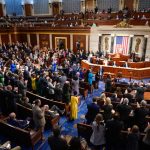
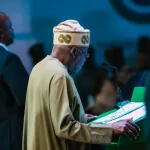





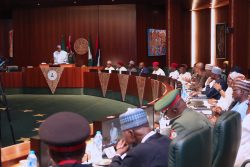
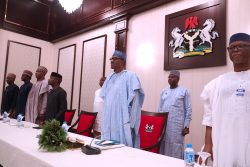


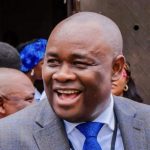





Leave a comment